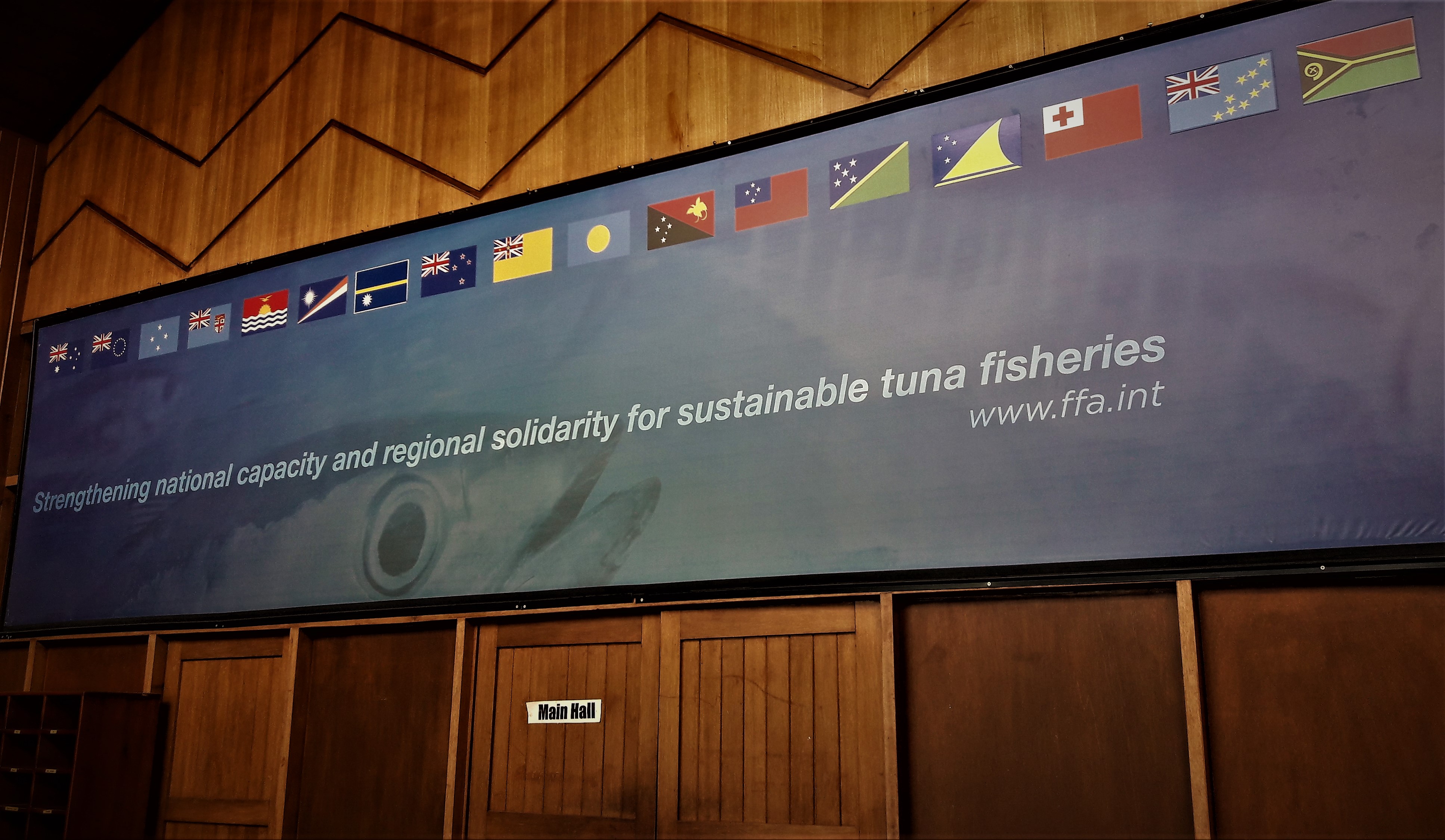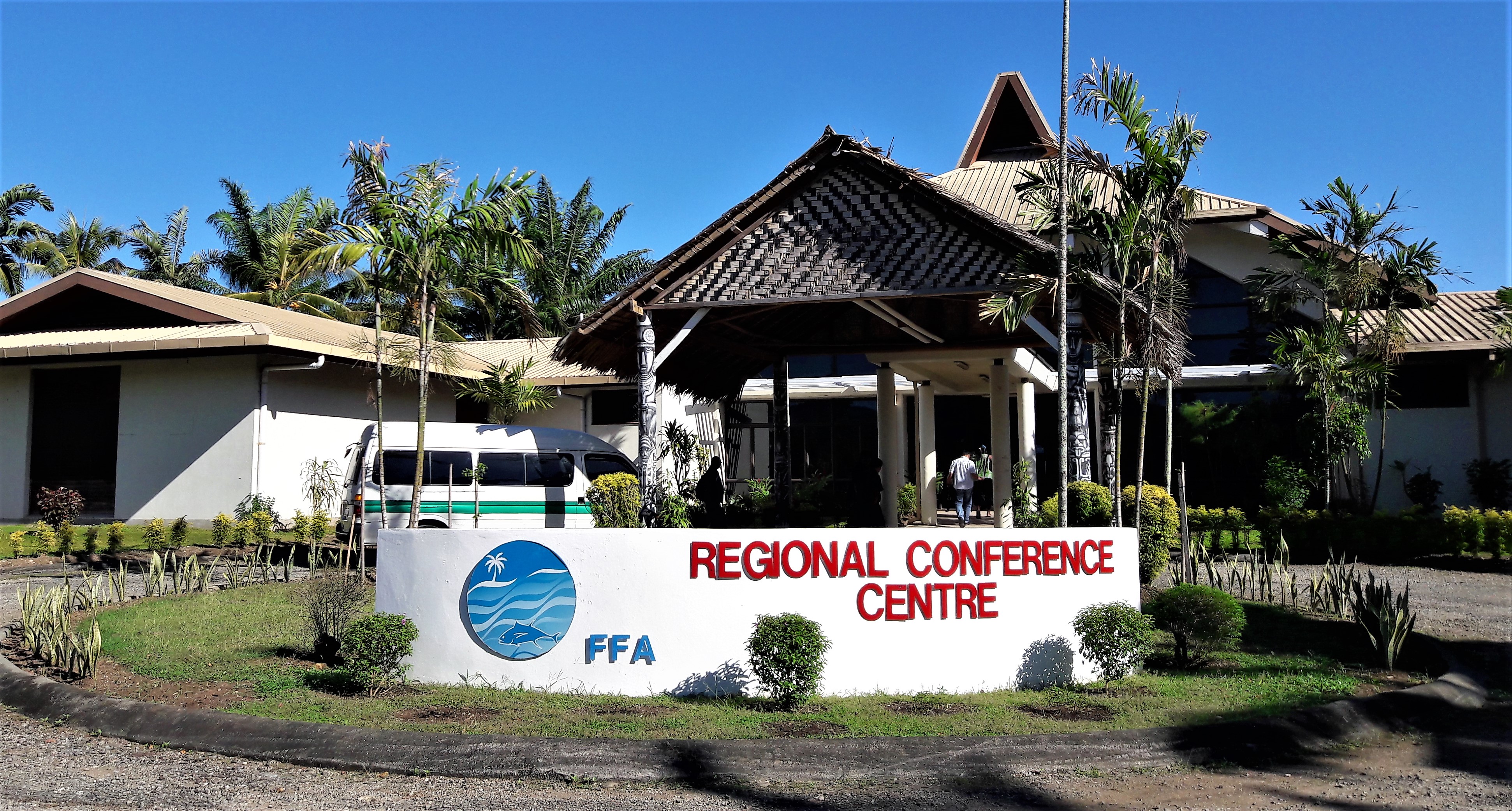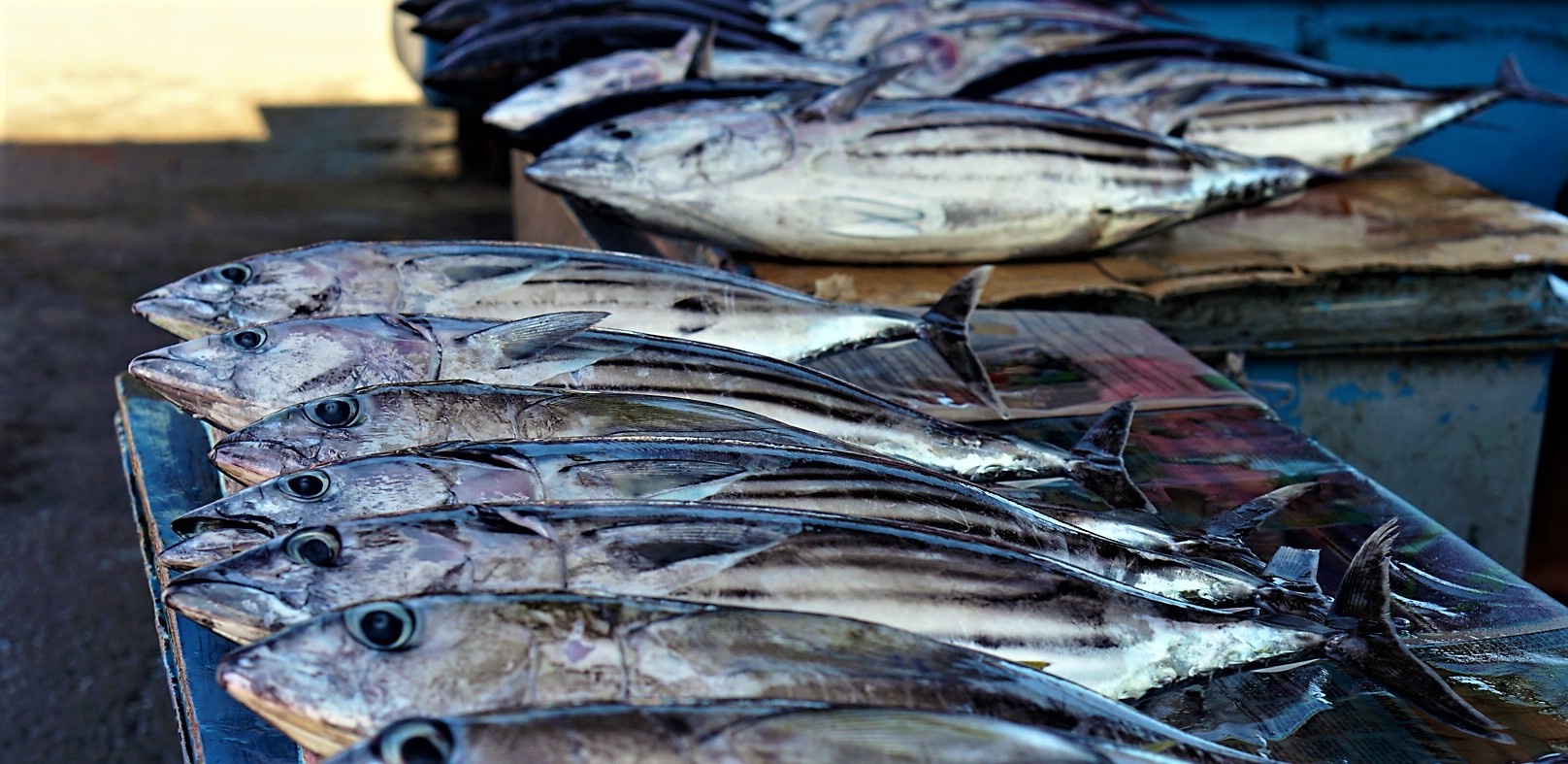Between 9-12 October 2017, the Forum Fisheries Agency hosted a Crewing Workshop in Honiara, Solomon Islands to discuss how to increase the benefits to Pacific Island economies from their fisheries resources. The Crewing Workshop addressed 2 questions:
- How to promote Pacific Islander crewing and increase Pacific Islander crew numbers on fishing vessels.
- How to develop and ensure minimum employment standards for any Pacific Islander fishing crew employed in the commercial fishing industry.
These questions were considered over 4 days by Government officials, training school representatives and private sector representatives from Fiji, Federated States of Micronesia, Kiribati, Marshall Islands, New Zealand, Papua New Guinea, Samoa, Solomon Islands, Tonga, Tuvalu and Vanuatu. This bulletin sets out the complex legal and governance challenges and the outcomes from the FFA workshop.

The FFA - value of tuna stocks - aims of the FFA
The Forum Fisheries Agency is established by treaty and represents the interests of its 17 Member States in the Pacific that together hold the rights to harvest the World's last remaining healthy stock of tuna as well as other fish species and mineral resources. The annual landings of tuna from the Pacific alone are valued in the USD billions and have been estimated to be worth up to USD20 billion
The vision and aim of the FFA is to encourage sustainable management of its Member States' valuable fisheries resources, collaboration between Member States and to maximise the economic benefits flowing back to their economies.
The legal and practical challenges
If more Pacific Island crew are employed in the commercial fishing industry it should deliver meaningful economic benefit back to the Pacific Island economies.
However, the FFA and its Member States do not want to compromise the safety, or working conditions, of Pacific Islanders and they are acutely aware that the commercial fishing industry provides difficult and potentially hazardous working conditions. There are also complex legal challenges around regulating and enforcing minimum employment standards.
It is the nature of commercial fishing and in particular where it takes place that creates the complex legal challenges. This is because the commercial fishing in question takes place in FFA Member States' Exclusive Economic Zones (EEZs) where Pacific Islands have certain prescribed sovereign and exclusive rights but do not have territorial sovereignty.
The sovereign and exclusive right of FFA Member States to harvest fish from their claimed EEZs is bestowed by operation of International Law and is a right recorded in Article 56 of the UN Convention on the Law of Sea (UNCLOS). In accordance with the Law of the Sea, the Coastal State (the State that has claimed the EEZ), has a duty to manage the fish stocks within its EEZ and if it cannot capture the fish stocks up to the Optimum Sustainable Yield (OSY) it must permit "foreign" fishing vessels to harvest those fish. The permission to access and harvest EEZ fisheries may be subject to conditions including a licence fee and the type of fish that may be caught, and how many. It is the licence fee that provides much needed sources of revenue to Pacific Island/Coastal States.
While Coastal States can regulate the fishing activity within their EEZs (Art. 56 of UNCLOS, provides the exclusive right to "exploit, conserve and manage" those resources), this right does not, in the absence of the express agreement by the licensed foreign fisher, enable the Coastal State to impose the Coastal State's employment law standards onto the foreign fishing vessel. In fact, pursuant to UNCLOS foreign fishing vessels have their own rights including the right to freedom of the seas, and to fish without conditions on the high seas and are ultimately regulated by the foreign fishing vessel's Flag State. The complexities all arise because EEZ's are not part of Coastal State's territories and the following further points must also be considered to understand the context:
- The Law of the Sea (UNCLOS) requires each ship or vessel to be registered (flagged) to only one State at a time (the Flag State) and that Flag State's law regulates the ship or vessel's employment law standards and is ultimately responsible for any enforcement of employment standards.
- At present, there are no globally adopted minimum standards of employment that apply to the commercial fishing industry. Although the ILO Work in Fishing Convention (c-188) enters into force in November 2017, it requires States to adapt their legislation to meet c-188 before ratifying the convention. Further the Maritime Labour Convention that applies to the majority of Flag States in relation to commercial shipping expressly excludes commercial fishing vessels.
- All FFA Member States have different and varied minimum employment standards in their national law and there is a lack of harmonisation between FFA Member States regarding employment law standards.
- Foreign commercial fishing vessels may choose not to enter the port of any FFA Member State and therefore will not become subject to the Port/Coastal State's jurisdiction to exercise jurisdiction in relation to vessel safety or other issues.
It should be remembered that these legal challenges (set out above) only arise when the Coastal State grants a fishing licence to a fishing vessel flagged to another State. Australia and New Zealand have both adopted innovative but different solutions to address these legal challenges that enable Australia and NZ to regulate all fishing vessels within their respective EEZs.
In Australia's case the capacity of their domestic commercial fishing fleet is such that it is able to fish up to the Optimum Sustainable Yield (OSY) within its EEZ and therefore Australia is not obliged to, and does not, provide licences to foreign flagged vessels within its EEZ. This means that commercial fishing vessels in Australia's EEZ are flagged to Australia and as the Flag State, Australia is able to apply and enforce Australian law including employment standards.
New Zealand's approach is perhaps more radical still as it has enacted specific legislation that requires all foreign flagged commercial fishing vessels who want to fish in the NZ EEZ to reflag their vessel to New Zealand (register in NZ). This approach forces all commercial fishing vessels regardless of ownership of the vessel to register in and submit to the NZ jurisdiction, thus enabling NZ to apply and enforce NZ employment/labour and health and safety standards (amongst others).
Further, it should be remembered these legal challenges relating to regulating employment standards do not arise where the commercial fishing vessel is flagged to the Coastal State that enjoys the sovereign rights in its EEZ.

The Outcomes from the FFA Crewing Workshop
The overall aim of the FFA Crewing Workshop was to consider the legal and practical challenges of securing more employment for Pacific Island crew and to determine the best next steps to encourage more employment and decent minimum working conditions.
The particular points that the Crewing Workshop noted included:
- It would not be practical at this stage for FFA Members to follow the examples of either NZ or Australia.
- Licence fees remain critically important to FFA Member economies.
- Minimum employment standards vary considerably between FFA Member States and would take time to harmonise employment laws.
- FFA Member States exercise their rights to agree minimum employment standards that should apply when negotiating access to the Coastal State's EEZ and include any agreed minimum standards via the fishing licence conditions.
- The fisheries legislation in every FFA Member States provides wide powers to impose licences and licence conditions as well as sanctions for breaches of licence conditions. It was also noted that licence conditions have already successfully addressed issues such as the ban on transshipment at sea and the closure of high seas pockets, and there is also a basis in international law to assert regulatory authority over citizens from the State asserting that regulatory function.
- The ILO Work in Fishing Convention (c-188) provides sound minimum standards that should apply to commercial fishing vessels, but the concern is that with the exception of the EU, none of the Distant Water Fishing Nations operating in the region have ratified the Convention.
- The Pacifical Social Accountability Guidelines that apply to the conditions of crew on purse seine vessels undertaking fishing trips for MSC certified sustainably caught free school skipjack and yellowfin tuna are consistent with the Work in Fishing Convention.
- The Treaty with the United States that included access to certain FFA Member States EEZs includes provisions to encourage the employment of Pacific Islanders with minimum employment standards regulated by US law, however, in reality little progress has been made in implementing the Treaty. It was considered more priority should be given to this.
- More information on the number of Pacific Island crew employed on commercial fishing vessels (domestic and foreign flagged) needed to be gathered and this should be mandatory for FFA Member States.
- The proposal from Tuvalu was to implement PNA decisions to increase employment on Distant Water commercial fishing vessels as a condition of access/licence to fish. Although this proposal has been made, at present, it has not been implemented.
- Training of crew safety on commercial fishing vessels needed to be improved and brought into line with SCTW-F despite this convention not being formally adopted.
- The Fisheries Task Force consisting of SPC, the Forum Fisheries Agency (FFA), Parties to the Nauru Agreement (PNA) Office and the Forum Secretariat (PIFS) should continue to work in this area to meet the target of 9,000 additional jobs being created in the fisheries sector by 2020.
The FFA Crewing Workshop also considered updates from both FFA Member government representatives and industry representatives that attended. Some common themes that emerged from this included:
- There are practical concerns for Pacific Island crew that include: the time spent away from home, language concerns, ability to understand the contract, isolation concerns and these may lead to the high turnover of Pacific Island crew.
- Local or National fleets are better placed or suited to employ Pacific Island crew and as an example: NFD in Solomon Islands has fully localised the existing pole and line fleet and one purse seine vessel.
- More should be done to train Pacific Island crew and there should be focus on skilled employment including officer level not just on deck hands.
- Despite the issues and concerns there is potential to increase Pacific Island crewing levels and the conditions on US flagged vessels and purse seiners are known to be better. For example, Tuvalu has been successful in putting crew on cargo ships with wages being approximately US$500 per month as a starting salary up to US$1,000 per month with experience. This compares with a wage of US$160 per month on Taiwanese purse seine vessels and US$350 per month on US vessels.
In terms of possible next steps, the FFA Crewing Workshop expressly considered developing Draft Labour/Employment Standards as these would assist by setting out a regionally agreed international standard and considered that the following should be recommended:
- The development of an overarching regional framework for crewing standards.
- All FFA Member States should consider the incorporation of minimum terms and conditions into licensing condition and/or access arrangements.
- Ratification of SCTW-F and the Work in Fishing Convention by FFA Member States, while not immediately addressing the complex extra-territorial legal context, would provide a basis for labour standards, which could be put into access agreements and/or licensing conditions.
- FFA Member States should update their national employment legislation to meet the Work in Fishing Convention requirements.
- Before anything is finalised extensive consultations with industry should be conducted.
- Consideration should be given to including a provision for a base wage of US$20 per day plus a share component of US$1 per tonne of fish caught or equivalent package.
The Crewing Workshop made some practical recommendations relating to employment contracts for Pacific Island Crew and. amongst other things, considered that the contract of employment should:
- Be in English and clearly specify the responsibilities of the employer and employee.
- Be fully explained to the crew member before signing with an adequate opportunity to seek legal advice.
- Specify that provisions and equipment are to be provided and that food provided should be adequate and nutritious.
- Set out wages or catch share arrangement and it was suggested that a base wage should be set at US$20 per day plus a catch share provision of US$1 per tonne or equivalent.
- Include termination provisions should and possibly include dispute settlement provisions and/or practical provisions for arbitration.
- Provide protection in the event of injury, sickness, death should be included plus a provision for the repatriation of human remains should a crew member die.
- Provide paid leave entitlement.
- Provide a repatriation entitlement.
- Guarantee a collective bargaining entitlement.
- Include superannuation provisions in accordance with the FFA Member State national law.
- Be for a duration of one year, renewable by mutual agreement.
The FFA Crewing Workshop recommended that regionally agreed minimum terms and conditions (MTCs) for licensing of commercial fishing vessels to fish within a FFA Member EEZ be developed. These regionally agreed MTCs would, amongst other things: only apply to Pacific Island crew, be a condition of the access/licence, should comply with the ILO Work in Fishing Convention (c-188), include details relating to how Pacific Island crew are tracked and monitored and provide a regionally agreed minimum set of standards.
In its wrapping up the participants of the FFA Crewing Workshop recognised the excellent coordination and facilities offered by the FFA and noted that further work is needed to collect more information relating to current Pacific Island crewing in the region, and national profiles should be developed for crewing activities.
Conclusions
It is correct that FFA Member States should receive a fair proportion of the revenue from their exclusive harvesting rights that they have in their EEZs. There is also a link between fishing vessels that want to comply with regulatory standards and a reduction in IUU fishing. However, the sovereign rights to harvest come with duties, limits and responsibilities that present complex legal challenges to requiring the employment of more Pacific Island crew and regulating and enforcing good working conditions for those Pacific Island crew.
It is becoming increasingly apparent that controlling access to the valuable fisheries of the FFA Member States provides leverage to require compliance with fisheries laws that are aimed at sustainable management and good governance.
In accordance with the Law of the Sea and national legislation across the FFA Member States, fishing licences and conditions may also be imposed in return for access to fish. The outcomes of the FFA Crewing Workshop indicate that in the near future FFA Member States may also negotiate better and more meaningful employment for Pacific Island crew as part of the lawful conditions to access and harvest fisheries resources over which FFA Member States enjoy the exclusive sovereign rights to "exploit, conserve and manage".

Fish on sale in Honiara Market, October, 2017
Please note that this bulletin provides only a summary of the FFA Crewing Workshop, its outcomes, discussions and agreements, and the author's views are his own and he does not speak on behalf of the FFA or any FFA Member State. If more information is required regarding the FFA Crewing Workshop and its outcomes please contact Mr Len Rodwell: leonard.rodwell@ffa.int
Please further note:
This legal bulletin is provided for general information purposes only and it is not, and should not be relied on as, legal advice.



